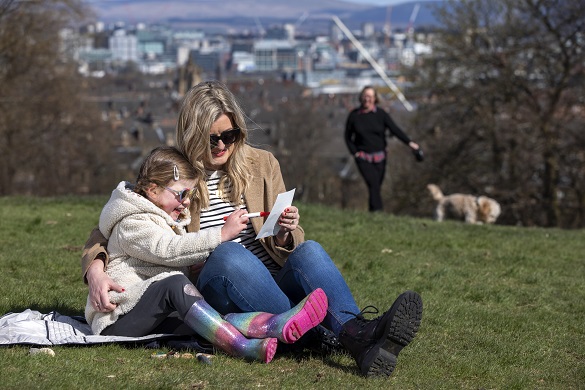New research to explore experiences of walking and creativity during COVID-19
Published on

The University of Liverpool is part of a new collaborative research project exploring people´s experience of walking during the Covid-19 pandemic.
The Walking Publics/Walking Arts: walking, wellbeing and community during COVID-19 project will also look at the role of creativity – or creative walking - in those experiences.
The project is funded by the Arts and Humanities Research Council as part of the UK Research and Innovation rapid response to COVID-19.
As part of the research, the project team are asking artists and people across the UK to take part in a survey to help capture the experiences of walking and creativity during the COVID-19 pandemic.
Already the academics have been finding examples of this creativity at work across the United Kingdom, including colourful stone trails created for and by children; Fairy Trails which have transformed local woods into sites of enchantment; decorated and illuminated windows which have enlivened neighbourhoods and activities such as I Spy or I Can See It Bingo intended to keep both minds and feet engaged and curious.
The project is led by the University of Glasgow and involves academics from the University of Liverpool, University College Cork and the University of East London.
Professor Heddon, from the University of Glasgow, said: “We know that walking is good for people in all sorts of ways. It helps with physical and mental health. Existing surveys tell us that more people have been walking more during Covid-19, but we don’t yet know enough about their actual experiences of walking: who is walking, where are they walking, why are they walking, even how they are walking and how they feel about walking?
“Alongside that, why might people not be walking, or what are the different challenges people face in participating in walking? A year is a long time to be walking the same paths around the local park so we are also keen to know if creative activities that can be done while walking, or walks that are themselves creative, have helped sustain people’s motivation, increased their enjoyment in walking, or offered ways for people who are physically distanced to connect creatively and imaginatively.”
Dr Morag Rose, Lecturer in Human Geography at the University of Liverpool, said: “Our research wants to know more about all the ways in which creativity has been connected to walking, so that we can celebrate and share these tactics to support more people to walk well and safely during and beyond the pandemic. We know that creative walking can help to connect people socially, while they have been distanced physically.”
The researchers also want to connect with artists across the UK who use walking as part of their artistic practice and others who maybe for the first time have turned to walking as a creative resource during COVID-19
Clare Qualmann, Senior Lecturer in Performing Arts at the University of East London, said: “Over the last year we have for example seen theatre practitioners create audio walks to continue making work when theatres are closed. There’s a significant group of artists who already define themselves as Walking Artists, and some of them have been creating regular remote walks to support and connect people, irrespective of physical distance.
“We want to know how these artists have adapted their work to COVID-19, and what we can learn from them to support more people to walk well.”
As well as collecting experience of walking and creativity during Covid, the researchers aim to work with artists to create a free walking toolkit, which they hope will sustain or inspire more walking by more people.
Maggie O’Neill, Professor in Sociology & Criminology at University College Cork (UCC), said: “As we emerge from the pandemic, we need to recover from it. Given the multiple potential benefits of walking, including enjoyment and pleasure, we think that anything that supports more people, and more diverse people, to walk and keep walking, will be vital. Walking is not just something you do on foot. Those using wheelchairs and other mobility aids go for walks and we want to hear about their experiences over the last year too.”
The research project is also collaborating with a range of walking organisations to explore the potential of creative walking (Ramblers Scotland, Paths for All, Living Streets, Sheffield Environmental Movement) along with cultural organisations like Glasgow Life, Open Clasp Theatre Company, and Museum of London Archaeology (MOLA).
Dr Sara Perry, Director of Research & Engagement at Museum of London Archaeology (MOLA), said: “We know that our cultural sector faces significant ongoing challenges as a result of the pandemic, in terms of audiences and participation, and an increasing need to connect and engage locally. Walking is one of the main activities that can be done safely at the moment. We are keen to support cultural organisations to understand more about walking as a creative and cultural activity. Walking is good for your health, and so is cultural participation. Bringing them together in this innovative partnership is a win-win.”
To share your experiences of walking during COVID-19, whether you are an avid walker or a reluctant walker, please complete our survey webpages - https://walkcreate.gla.ac.uk/index.php/walking-publics/ or via the project’s website. If you are an artist who has used walking as a resource, the project team would like to hear from you through this survey.
The surveys opens for a month on 21 April 2021 and closes on 21 May 2021.